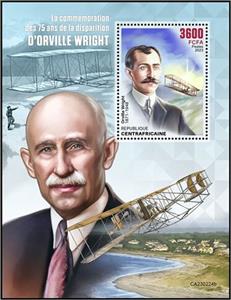Souvenir Sheet: Orville Wright (1871–1948) (Central African Republic 2023)
Orville Wright (1871–1948) (Central African Republic 2023)
10 February (Central African Republic ) within release Orville Wright (2023) goes into circulation Souvenir Sheet Orville Wright (1871–1948) face value 3,600 Central African CFA franc
| Souvenir Sheet Orville Wright (1871–1948) in catalogues | |
|---|---|
| Colnect codes: | Col: CF 2023.02.10-48 |
Souvenir Sheet is square format.
Also in the issue Orville Wright (2023):
- Mini Sheet - 75th Anniversary of the Death of Orville Wright face value 4*1000;
- Souvenir Sheet - Orville Wright (1871–1948) face value 3,600;
- Stamp - Orville and Wilbur Wright 1871–1948/1867–1912 face value 1,000;
- Stamp - Orville Wright 1871–1948 face value 1,000;
- Stamp - Orville Wright 1871–1948 face value 1,000;
- Stamp - Wright Flyer face value 1,000;
- Mini Sheet - Orville Wright (1871–1948) face value 3*1000;
- Mini Sheet - Orville Wright (1871–1948) face value 4*1000;
- Mini Sheet - Orville Wright (1871–1948) and Wilbur Wright (1867–1912) face value 3*1000;
- Mini Sheet - Wright Flyer face value 3*1000;
Souvenir Sheet Orville Wright (1871–1948) it reflects the thematic directions:
An aircraft (pl. aircraft) is a vehicle that is able to fly by gaining support from the air. It counters the force of gravity by using either static lift or the dynamic lift of an airfoil, or, in a few cases, direct downward thrust from its engines. Common examples of aircraft include airplanes, rotorcraft (including helicopters), airships (including blimps), gliders, paramotors, and hot air balloons.Part 1 (Definitions and Abbreviations) of Subchapter A of Chapter I of Title 14 of the U. S. Code of Federal Regulations states that aircraft "means a device that is used or intended to be used for flight in the air."
An anniversary is the date on which an event took place or an institution was founded in a previous year, and may also refer to the commemoration or celebration of that event. For example, the first event is the initial occurrence or, if planned, the inaugural of the event. One year later would be the first anniversary of that event. The word was first used for Catholic feasts to commemorate saints. Most countries celebrate national anniversaries, typically called national days. These could be the date of independence of the nation or the adoption of a new constitution or form of government. The important dates in a sitting monarch's reign may also be commemorated, an event often referred to as a "Jubilee".
Aviation is the practical aspect or art of aeronautics, being the design, development, production, operation and use of aircraft, especially heavier than air aircraft. The word aviation was coined by French writer and former naval officer Gabriel La Landelle in 1863, from the verb avier (synonymous flying), itself derived from the Latin word avis ("bird") and the suffix -ation.
An invention is a unique or novel device, method, composition, idea, or process. An invention may be an improvement upon a machine, product, or process for increasing efficiency or lowering cost. It may also be an entirely new concept. If an idea is unique enough either as a stand-alone invention or as a significant improvement over the work of others, it can be patented. A patent, if granted, gives the inventor a proprietary interest in the patent over a specific period of time, which can be licensed for financial gain.



